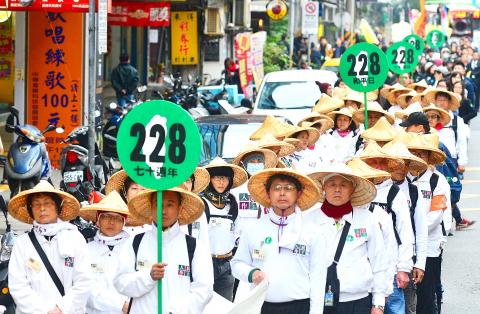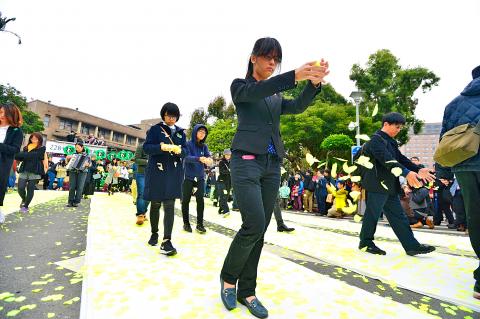Hundreds of campaigners marched in Taipei yesterday to commemorate the 228 Incident, calling for the government to officially assign responsibility for the massacre which followed a 1947 protest.
Escalating protests swept Taiwan on Feb. 28, 1947, after Tobacco Monopoly Bureau agents confiscated contraband cigarettes from a woman outside Taipei’s Tianma Tea House (天馬茶房) on Nanjing W Road on Feb. 27. When the woman was hit on the head by an officer holding a gun, the crowd surrounded the agents, who responded by fleeing with one agent shooting into the crowd and killing a bystander.
A subsequent bloody crackdown by the then-Chinese Nationalist Party (KMT) regime systematically killed many Taiwanese.

Photo: Wang Yi-song, Taipei Times
Only partial documentation of the events and victims has been recovered, with the government-funded 228 Memorial Foundation officially recognizing more than 2,200 victims.
More than 26 groups were represented at yesterday’s march through key historic sites, but no individual banners were raised.
Campaigners solemnly read out the names of those who were killed or went missing in the Incident.

Photo: Wang Yi-song, Taipei Times
“As the victims are gradually forgotten, Feb. 28 has diminished into a holiday lacking emotion,” Nylon Cheng Liberty Foundation managing director Cheng Tsing-hua (鄭清華) said. “We are still at the starting line in terms of discovering the truth, because the identities of many victims and perpetrators are unknown.”
He called for the government to hasten passage of transitional justice legislation, which would establish a special committee with powers to investigate the Incident and other injustices under the then-KMT authoritarian rule.
Government discussions over the fate of the National Chiang Kai-shek (蔣介石) Memorial Hall were “more symbolic than substantial,” he said.
“The victims of the 228 Incident are not just those listed, its greatest victim was Taiwan itself, including the descendants of the perpetrators,” he said. “Without the truth, we do not have the preconditions for forgiveness.”
Cheng is a brother of democracy movement pioneer Deng Nan-jung (鄭南榕), who in 1987 spearheaded a national campaign for Feb. 28 to be designated a national holiday shortly after the lifting of martial law.
Veteran activists Chen Yung-hsing (陳永興) and Lee Sheng-hsiung (李勝雄), who collaborated with Deng, led yesterday’s procession as it wound its way from Nanjing W Road to the Executive Yuan, where troops fired into a crowd of protesters during the massacre. The building served as the headquarters of then-Taiwan Governor Chen Yi (陳儀).
The march also passed the former site of a Tobacco Monopoly Bureau office which was sacked the same day, and a radio station building which was occupied and used to spread word of the protests.
The procession concluded with a prayer and singing while participants scattered satin flower petals over white cloth to symbolize mourning.

SECURITY: As China is ‘reshaping’ Hong Kong’s population, Taiwan must raise the eligibility threshold for applications from Hong Kongers, Chiu Chui-cheng said When Hong Kong and Macau citizens apply for residency in Taiwan, it would be under a new category that includes a “national security observation period,” Mainland Affairs Council (MAC) Minister Chiu Chui-cheng (邱垂正) said yesterday. President William Lai (賴清德) on March 13 announced 17 strategies to counter China’s aggression toward Taiwan, including incorporating national security considerations into the review process for residency applications from Hong Kong and Macau citizens. The situation in Hong Kong is constantly changing, Chiu said to media yesterday on the sidelines of the Taipei Technology Run hosted by the Taipei Neihu Technology Park Development Association. With

CARROT AND STICK: While unrelenting in its military threats, China attracted nearly 40,000 Taiwanese to over 400 business events last year Nearly 40,000 Taiwanese last year joined industry events in China, such as conferences and trade fairs, supported by the Chinese government, a study showed yesterday, as Beijing ramps up a charm offensive toward Taipei alongside military pressure. China has long taken a carrot-and-stick approach to Taiwan, threatening it with the prospect of military action while reaching out to those it believes are amenable to Beijing’s point of view. Taiwanese security officials are wary of what they see as Beijing’s influence campaigns to sway public opinion after Taipei and Beijing gradually resumed travel links halted by the COVID-19 pandemic, but the scale of

A US Marine Corps regiment equipped with Naval Strike Missiles (NSM) is set to participate in the upcoming Balikatan 25 exercise in the Luzon Strait, marking the system’s first-ever deployment in the Philippines. US and Philippine officials have separately confirmed that the Navy Marine Expeditionary Ship Interdiction System (NMESIS) — the mobile launch platform for the Naval Strike Missile — would take part in the joint exercise. The missiles are being deployed to “a strategic first island chain chokepoint” in the waters between Taiwan proper and the Philippines, US-based Naval News reported. “The Luzon Strait and Bashi Channel represent a critical access

Pope Francis is be laid to rest on Saturday after lying in state for three days in St Peter’s Basilica, where the faithful are expected to flock to pay their respects to history’s first Latin American pontiff. The cardinals met yesterday in the Vatican’s synod hall to chart the next steps before a conclave begins to choose Francis’ successor, as condolences poured in from around the world. According to current norms, the conclave must begin between May 5 and 10. The cardinals set the funeral for Saturday at 10am in St Peter’s Square, to be celebrated by the dean of the College